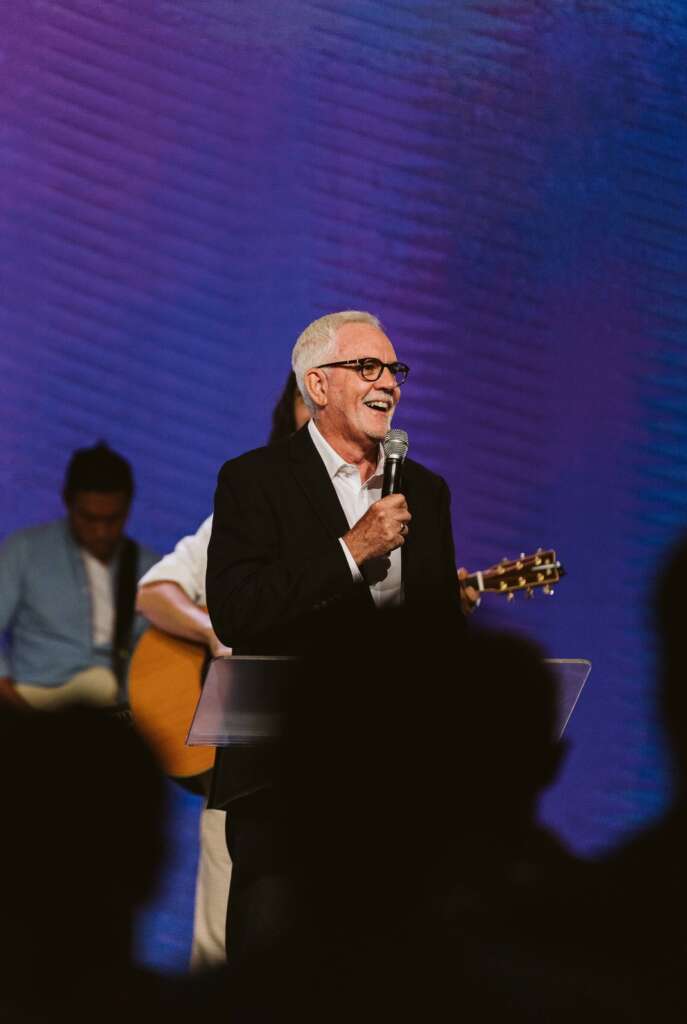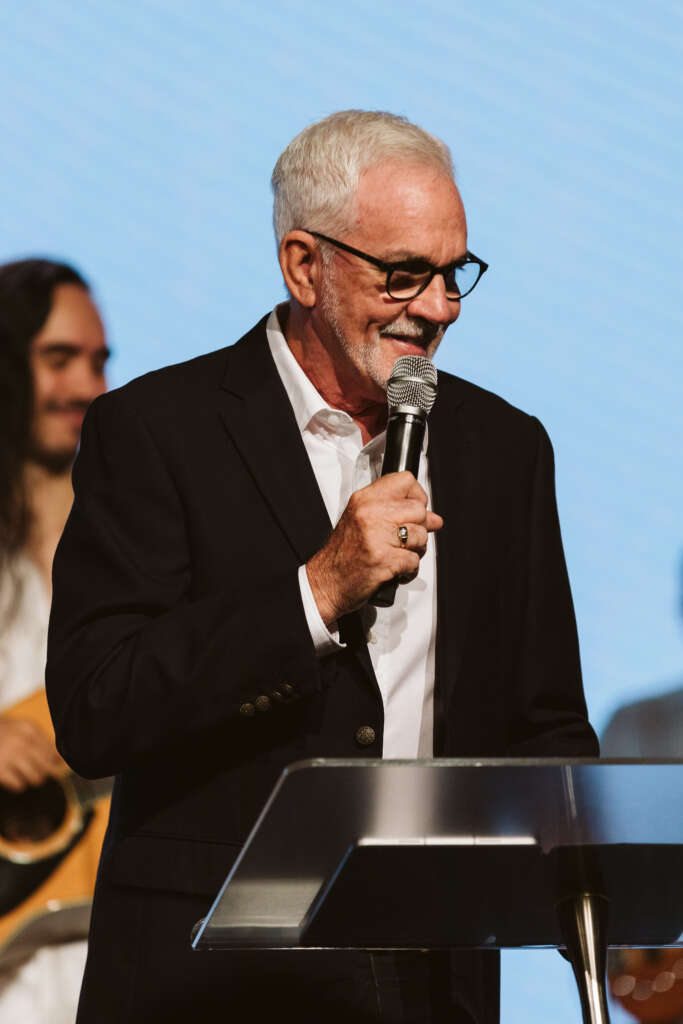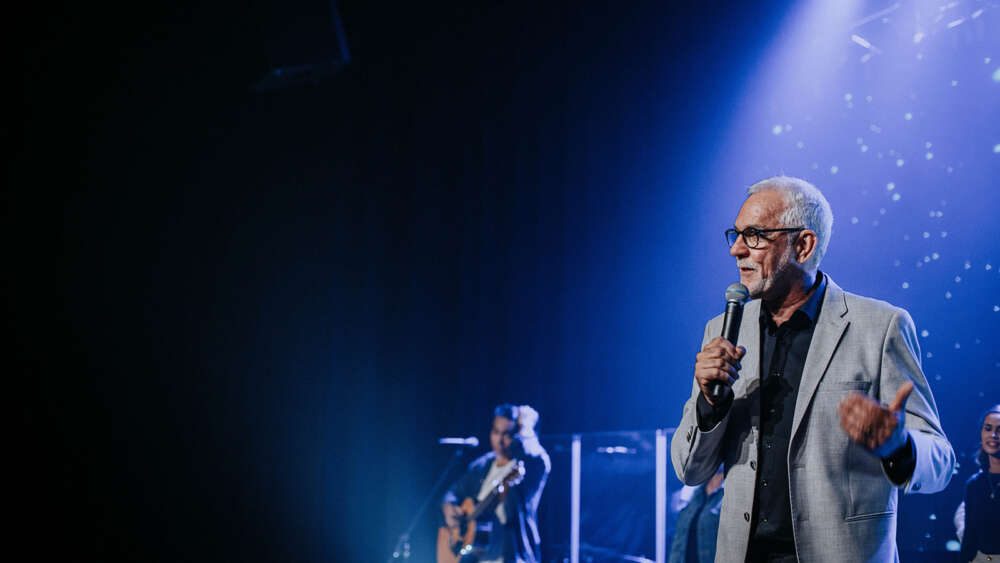Healing the scars of a fatherless life
Wayne Alcorn’s new book on restoring a generational wound
Pastor Wayne Alcorn reckons there are many men sitting in church services across the country with their arms crossed, disengaged from worship, because they feel an underlying resentment towards God.
They can’t relate to God the Father or embrace his love because of troubles in their relationships with their earthly fathers.
While saved, they are limping towards heaven, unable to be an effective ambassador for God’s king because of this “father wound.”
Alcorn, National President of the Australian Christian Churches, and pastor of the thriving multi-campus Hope Centre in Southeast Queensland, cites the example of a man who was so scarred from his dysfunctional relationship with his father that he was unable to say the Lord’s Prayer.
“He had a horrible background as a child. His life was horrible. A father that had massive mental health issues and I said to him, ‘You’ve been a follower of Jesus for 20 or 30 years, how do you say the Lord’s Prayer? How do you pray to God the Father?’ And he looked at me, and he said, ‘Oh, I don’t. I talk to Jesus and I hope he passes it on.’
“Now that would be funny if it wasn’t so tragic. He can’t relate to God as father.”
“How do you pray to God the Father?’ And he looked at me, and he said, ‘Oh, I don’t. I talk to Jesus and I hope he passes it on.’”
In his new book, My Father’s Son: A Generational Journey, published by Acorn Press, Alcorn maps out a healing pathway for emotionally damaged men that allows them to write a new family tree.
“If you don’t like your family tree, plant a new one. That’s what my father did. So maybe you are the generation that says ‘This is where it ends – my kids and my grandkids and their kids, this is the way this family’s going to be,’” he says.
“We’re going to stop this rot and move forward to where people are growing up whole and flourishing in life.”
Alcorn discovered the prevalence of this father wound early in his ministry among youth. The founder of the Youth Alive movement who was also a youth leader at his father Alex’s church in Ipswich, outside of Brisbane, saw a clear pattern.
“I’d go to court with a young person. I’d counsel some kid at a youth camp, and all of a sudden, I realised so many of them were void of genuine father’s love. I’ve never been to court with a kid that had a decent relationship with their father,” he recalls.
“I shelved that by large and just got on with my job for nearly 20 years working with teenagers through a local youth and for many, many years in Youth Alive.”
 Then in 1999, just before the millennium turned, Alcorn received a prophetic word as he was due to get up and preach in Melbourne.
Then in 1999, just before the millennium turned, Alcorn received a prophetic word as he was due to get up and preach in Melbourne.
“I heard as clearly as I’ve ever heard God’s voice, ‘You’ve spent the last 20 years helping teenagers. Now it’s time to help their fathers.’ And without me trying to do anything, I start getting invited to more and more men’s events.”
That’s when he realised that when fathers say they want their kids to “come right, they’ve got to come right themselves.”
“And the more I realised a lot of these men’s dysfunction comes out in the brokenness that comes from their own relationship with their father. And generationally, it’s being handed down,” he says.
“Our news every night is filled with stories of juvenile problems. I guarantee we won’t find too many of those kids in juvenile crime that have got a decent home life, good relationship with the dad, whose dads are stable, whose dads aren’t in trouble themselves.”
But before you think it’s just children of criminals and drug addicts who suffer a father wound, Alcorn gives the example of the son of a well-known politician who suffered the damaging effects of an absent father.
“He got emotional on the phone and said, ‘Everybody loved my dad; I just didn’t know him.’ These aren’t just drug-addicted, criminal fathers. These are people sometimes highly professional. They’re providing the best education and the best homes, and yet they’re just never there. And the kid just says, ‘Would you just sit down and talk to me?’”
Alcorn was struck by a lightbulb moment early in this phase of his ministry when he told the story of Dick and Rick Hoyt while preaching on the Father’s love in North Queensland. To quote from the book:
“My goal that day was to inspire men in their journey through life. In one of the sessions, I showed a video about the extraordinary story of Dick Hoyt and his son Rick, who had cerebral palsy. Rick loved sport and, after he graduated from college, he and Dick entered a fun run together. In the years that followed, Team Hoyt competed in over 1000 races, including 32 Boston Marathons. In 1989, officials granted special permission for Dick and Rick to participate in the Hawaiian Ironman. It’s a gruelling course. To add to the challenge, Dick had not long recovered from a heart condition, but they were determined to race. Dick towed his son in a boat in the 3.8 kilometre swim. He cycled 180 kilometres with Rick on the front of his bike. And he ran, pushing his son 42.2 kilometres in a wheelchair. They completed the race in just under 14.5 hours.”
 When the video ended, Alcorn asked the crowd of ordinary Aussie guys in North Queensland, ‘I wonder how many of you would be prepared to give up your healthy bodies to know the love of a father like that?’ And I looked across this room and there’s tear-stained faces everywhere. And I just thought, ‘I’m on to something here.’ Really that was a light bulb moment for me.”
When the video ended, Alcorn asked the crowd of ordinary Aussie guys in North Queensland, ‘I wonder how many of you would be prepared to give up your healthy bodies to know the love of a father like that?’ And I looked across this room and there’s tear-stained faces everywhere. And I just thought, ‘I’m on to something here.’ Really that was a light bulb moment for me.”
‘I wonder how many of you would be prepared to give up your healthy bodies to know the love of a father like that?’
Alcorn hastens to add that he’s not a counsellor or a psychologist but simply an observer of social trends. “I see patterns and I just started to see this is a big deal in our country, and probably in the Western world.”
He mentioned that one of his sons, a physical education teacher at a Christian school, came to him over a decade ago and said, ‘Dad, half the kids that I work with don’t have a dad. And most of the ones that do, their dads are disengaged.’”
His son then started a program that ran for many years in which he took teenagers without dads for 48 hours out the bush and had older guys teach them how to surf, fish and water ski – with remarkable results in transformed lives.
So what are the scars of living a fatherless life and how can they be healed?
“I honestly think the healing is twofold – there’s the divine and there’s the natural,” he says. “The divine is people need to have a relationship that comes from a revelation of the Father heart. That’s the ultimate healing. But there are also processes that facilitate and add to them.”
“Church should be like a hospital.”
Alcorn is a firm believer that the church has a big role to play in this healing journey – despite criticisms of its flaws.
“Church should be like a hospital. The hospital doesn’t do the healing, but it’s the place where the healing happens. So we’ve got to create places and spaces where men can be honest and vulnerable, and there God does his work,” he says.
“Hospitals are full of sick people, right? But in those hospitals, there are people that actually have worked stuff out to move forward and I think guys have just got to get into community. They’ve got to get into the Bible and they’ve got to get into God’s presence through prayer and worship.”
“Get into that slipstream where real men have discovered a real God. You get around what you want to become, so get around men who are working this out. Get around men that have worked it out a little further down the track than you.”
Alcorn cites the example of a guy at one of his campuses who spent much of his adult life in jail.
“And I’ve just watched how God’s restored him and now his family. When I go and speak at that campus and I see that man with his family worshipping God, you see his life – it’s on his face; he’s done it tough. But you see how God has restored him and all the stuff that he was in, honestly, it’s mind-blowing. But to see him now beaming and his family, loving God and that’s the only thing that ultimately heals. But you’ve got to put him into spaces where the healing takes place.”
While Alcorn had a great relationship with his own dad, he understands the father wound from the experience of his father, Alex.
“He was a legend, my dad. He was the town drunk at 24 but then followed Jesus from the day he knelt down in a gutter and for the rest of his life – 70 years. He had his own struggles that came out of the damage of his life. This is what people don’t realise. You come to Christ and you probably will still have a limp for the rest of your life, but you’ve got to limp to heaven. And my dad still wrestled with some of those things, like insecurity.
“But my dad was amazing. He was so loved. They called him the sheriff. He was like an old-school western sheriff, especially in the last 20 years of his life. He’d go in and help and fix churches and he was a preacher all my life and stayed true to his call.”
“You come to Christ and you probably will still have a limp for the rest of your life, but you’ve got to limp to heaven.”
With his grey hair, Alcorn says he genuinely feels a father responsibility for his church staff, most of whom are half his age.
“Lyn and I are mum and dad wherever we go. That’s my mission now, still leading a church. My own son is the executive pastor here – a phenomenal preacher – and I see him walking around here. He doesn’t carry any of those scars. His kids, my grandkids, walk around here like they own the place. And there’s just something really healthy about that.
“I know how life can be and my simple prayer is that something that’s written in my book can spark a conversation with others that’ll ultimately point people to the heart of God and they can know life to the full.”


